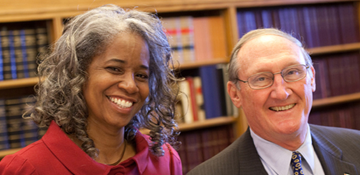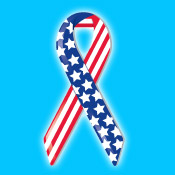Meet a Student: Janet Harrison
Category: Noteworthy

Janet Harrison, evening law student, is the first person ever to intern with the U.S. Supreme Court’s emergency applications clerk; photography: Chris Hartlove
Though she retired as a Maryland State Police sergeant in July after 26 years of service, taking a breather wasn’t exactly on the agenda just yet for UB School of Law evening student Janet Harrison, who plans to become a criminal defense attorney after she graduates in May. Case in point: While logging her final hours on the force early last summer, she was also juggling a prestigious internship with the U.S. Supreme Court’s emergency applications clerk in Washington, D.C. Harrison quickly put her constitutional law classes to use in the newly created position as she spent three days a week researching and summarizing cases for the court’s official records.
Q. How did you learn about the internship at the U.S. Supreme Court and what was involved in securing the position?
A. I learned about the internship … from my law professor, José Anderson, [who] is a friend of U.S. Supreme Court clerk William K. Suter.
Professor Anderson asked me if I was interested [in the internship], and of course I was. I then had to apply and wait to be accepted by the federal government as an intern, pending a preliminary interview with the clerk’s office.
Clerk Suter is also a friend of the University of Baltimore. His speech at [the] UB [School of] Law last year was about how lawyers can improve their oral arguments before courts, such as the Supreme Court.
Q. What were some of your responsibilities as a Supreme Court intern? What do you perceive as the importance of being the first person to hold this position?
A. I shadowed the emergency applications clerk [and] assisted him by reviewing the already decided emergency petitions. My responsibilities were to spot the issues that were being challenged, summarize the holdings in one or two sentences and update a database of these cases that the Supreme Court maintains.
[As the first intern,] I demonstrated … that UB has excellent students [who] can perform at a high level of skill and excellence. My hope is that in the future, when the Supreme Court needs another law intern, they will look first to the UB School of Law.
Q. What did you find most gratifying about this position?
A. I prepared a “Capital Case Summary” document that I later learned would be published [and] used by the clerk’s office as a guide to acclimate incoming interns [with] the emergency applications process as it relates to capital cases. … It was gratifying to know that others could gain from my experience and that the clerk’s office would have a handy tool to use to increase productivity and reduce the orientation phase.
Q. How did you juggle three important responsibilities—your job, the internship and your classes—at the same time?
A. [It] was made possible due to my supportive family. I worked long hours during those two months and was away from home more than I was there. I took leave when I needed, worked evenings or nights when I needed and altered my work schedule around my classes and the internship.
WebExtras

Meet a Student: Janet Harrison
Read more about the former police sergeant, standout law student and history-making intern.




